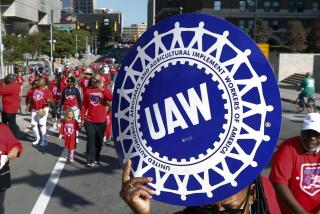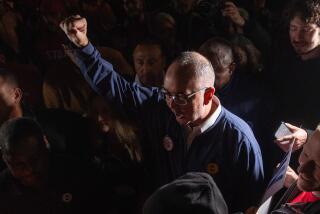UAW Wants Chrysler to Build ‘Liberty’ in U.S.
- Share via
DETROIT — In its contract talks with Chrysler, the United Auto Workers will try to force the company to agree to build its proposed “Liberty” small car in the United States rather than in Asia, UAW President Owen Bieber said at the opening bargaining session Monday.
“We have to negotiate, in these talks, that Liberty stays in the United States,” Bieber said at a press conference at Chrysler’s headquarters here.
The Liberty project is the No. 3 auto maker’s attempt to produce an all-new subcompact for the late 1980s that is competitive with the latest models from Japan and Korea. It is similar in concept to General Motors’ Saturn small-car project, but, unlike GM, Chrysler has not committed itself to producing its version in the United States. (GM plans to build the Saturn in Tennessee, beginning in 1988 or 1989.)
Liberty, like Saturn, was initially described by the company as an all-American import fighter. But, in April, Chrysler Chairman Lee A. Iacocca said the company might build the Liberty--or at least major components of the car--in Japan or Korea. Other Chrysler executives have since indicated that the auto maker has not made up its mind about where to build it.
On Monday, Bieber noted that keeping Liberty in the United States is part of the UAW’s larger push to force Chrysler to follow the labor pattern that the union has established at GM, not only on wages and benefits (which are now slightly lower at Chrysler than at GM) but also on the issue of the future of domestic production of small cars. “We surely are dedicated” to getting a pattern contract at Chrysler, Bieber said. “And I hope we follow the (Saturn) pattern at Liberty.”
Bieber has previously said that the union is willing to make contract concessions, principally on work rules, at any future Liberty plant similar to those granted Saturn for its planned Tennessee facility. “But before we negotiate any labor contract for Liberty, we have to make sure its built here,” he added.
Chrysler officials, on the other hand, don’t want to wait for Liberty to obtain Saturn-style labor concessions--they want them for their existing plants. But Bieber insisted that the Saturn contract was a special case and won’t become the pattern for industry-wide negotiations. “I don’t want to talk about Saturn where there is no Saturn,” he said.
Contracts Expire Oct. 15
Chrysler executives declined to meet with reporters on the first day of bargaining Monday. But Thomas W. Miner, Chrysler’s vice president for industrial relations and its chief negotiator, said in a statement that Chrysler “must remain competitive” and that the company is “certain the union is aware of Chrysler’s plans and needs and will temper its demands as these negotiations proceed.”
Chrysler’s contracts covering 70,000 UAW members in the United States and 10,000 in Canada expire Oct. 15. Negotiations between Chrysler and the Canadian UAW are scheduled to open today in Toronto.
Chrysler is the only Big Three auto maker that must negotiate with the UAW this year; GM and Ford won’t bargain with the union again until 1987. In order to bring future negotiations with Chrysler back into line with the rest of the domestic industry, Bieber said Monday that the union will seek a two-year contract, so that it will expire at the same time as those at GM and Ford.
Meanwhile, Bieber also said Monday that the union will try to convince Chrysler to invest more money in its existing plants so they can produce parts that are more competitive with those Chrysler is buying from outside suppliers.
Job Security an Issue
Chrysler has been shifting the production of many parts to foreign and domestic suppliers because it hasn’t modernized its own plants, Bieber complained. “We don’t think the proper investments have been made in some plants,” he said.
The union will also demand that Chrysler grant job-security guarantees similar to those hammered out in last year’s contract talks with GM and Ford, Bieber said. While there may be modifications, Bieber indicated that the UAW will try to establish something like the $1-billion job-security fund set up at GM in last year’s contract settlement.
A smaller fund of about $300 million was also established at Ford, and any fund at Chrysler would probably be even smaller.






